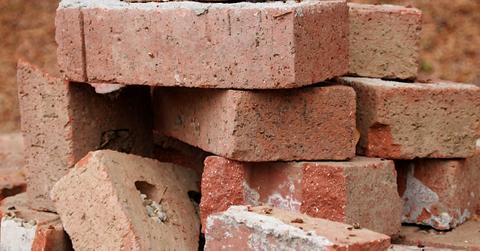A Rwandan Engineer Is Recycling Glass Bottles Into Bricks
By turning post-consumer glass waste into bricks, Aimable Mutabazi is reducing his construction company's carbon emissions.
Updated May 31 2019, 3:01 p.m. ET
At 32, Aimable Mutabazi already has his own construction and brick manufacturing company — but his bricks aren’t quite like the ones that hold up so many homes. The engineer started thinking about a better brick when he was still a sophomore at the University of Rwanda, wondering if there was a way to use waste as a raw material. Now, his business makes bricks with recycled glass and ceramics, rescuing tons of old bottles and windows from the local dump.
Mutabazi saw his solution as an environmental win-win. With glass concrete bricks, his company Byiza Vuba Ltd. simultaneously recycles waste and reduces emissions.
“The glass aggregate we use comes from used glasses and bottles, windows and car windshields,” he explained to The New Times. “Once the glass becomes waste, it creates a problem as it does not decompose. We use that waste glass in concrete as partial replacement of cement, it helps to reduce carbon dioxide emissions and glass waste dumping all over the place.”
Mutabazi sources the raw materials from a dump in Kigali, the capital city of Rwanda. Once the glass scraps are collected, he mixes them with sand, cement, and a little bit of coloring. Then he molds them into bricks with the help of a compression machine.
The end result is a more sustainable—and affordable—product.
“Compared to other bricks available on the local market, ours are very cheap,” he told The New Times. “For instance, for a house that costs 30 million, for us we can complete it for...10 million [in Rwandan francs]. This means our clients save up to 50 percent.”
Mutabazi also claims that his process results in stronger buildings. While he does not use cement to bind his bricks, he reinforces walls with steel rebar vertically and horizontally, “adding to the strength and making the structure earthquake resistant,” in his own words.
Mutabazi just brought his seven-month-old company to a wider audience, showcasing his innovation at the Rwanda International Trade Fair, where he’s generating new interest and picking up awards. Byiza Vuba took home the prize for best “young entrepreneur” on the showroom floor.
“Many people are interested in our products,” he said in the New Times interview. “So far, in two weeks we have got four clients who want us to build houses for them using our bricks but we hope to get even more because many are taking our contacts.”
The recycled glass brick concept has already hit other markets. The New York-based construction company Kingston Block & Masonry has been using post-consumer glass in its bricks since 2000, a design choice that the company claims has eliminated up to 30 percent of the carbon emissions from its manufacturing process. The EPA has also been recommending old glass as a base for bricks since at least 2003.
But Mutabazi’s company is making fresh waves in Rwanda, where the New Times says he’s already made a sizeable dent in the Kigali dump.
